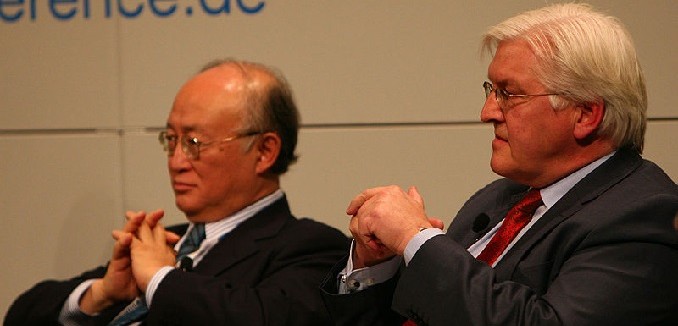The head of the United Nations’ nuclear watchdog has issued a renewed warning that Iran may currently be secretly developing a nuclear weapon. The International Atomic Energy Agency has repeatedly warned about possible clandestine nuclear weapons work being conducted by Tehran — a November 2011 report highlighted [PDF] “the possible existence… of undisclosed nuclear-related activities involving military-related organizations” — but the new statement by Yukiya Amano is unusual both in its explicitness and in its emphasis on ongoing work being done “now”:
Since then, however, IAEA reports have listed suspicions of tests and experiments past that date. Britain, France, Germany and Israel have also said that such work continued beyond 2003. While the United States has not publicly revised its 2007 intelligence assessment, its information remains a mainstay of IAEA assessments such as the one made by Amano on Tuesday.
“We do not know for sure, but we have information indicating that Iran was engaged in activities relevant to the development of nuclear explosive devices in the past and now,” he told The Associated Press in what appeared to be his most specific assertion that such activities are continuing into the present. While not going into detail , Amano said the IAEA’s information was “cross checked … so we have concerns.”
Meanwhile, Iran’s chief nuclear negotiator Saeed Jalili declared that Tehran would harden its negotiating stance after the country’s June presidential election:
Iran’s chief nuclear negotiator Saeed Jalili sounded a defiant note ahead of a new round of talks with world powers in Kazakhstan, saying on Thursday they had to recognize Iran’s right to enrich uranium to see any breakthrough… Jalili, speaking at a university in Almaty, said that stance would not change. “We think our talks tomorrow can go forward with one word. That is the acceptance of the rights of Iran, particularly the right to enrichment,” he said…
Jalili said Iran would continue to defend its policy regardless of a June presidential election, which Western diplomats say complicates Tehran’s approach to talks. “The impact of the election will be that … our people will defend their right with more rigor,” Jalili said.
Jalili’s statements sit uneasily alongside the analysis of some Western foreign policy experts and diplomats who have theorized that Iran’s Supreme Leader Ali Khamenei wants to make concessions but is waiting until after the elections to do so. The P5+1 is set to meet with Iran Friday in Kazakhstan.
[Photo: Harald Dettenborn / Wiki Commons]




